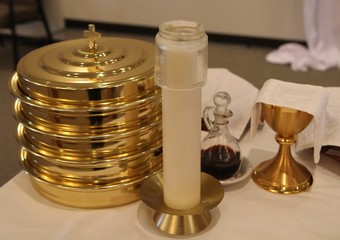|
We believe that in a mysterious way that we cannot rationally understand, the true presence of Christ is with us--in, with, and under the bread and wine. Our Church body has an open practice regarding communion. Participation in Holy Communion is open to all persons, whatever their age, who believe in Jesus Christ as their Lord and Savior. All believers are welcome at the Lord's table.
|
"Communion of the Saints"
On the second and fourth Sunday of every month Glory Lutheran celebrates Holy Communion or the Lord's Supper. Like Holy Baptism, Holy Communion is a sacrament. A sacrament is an act that was commanded by Jesus and which involves a verbal promise (e.g., forgiveness, life, salvation) and a physical sign (e.g. water, bread and wine). Over the centuries there have been many different ways in which Christians practiced Holy Communion. Even within a congregation there is no uniformity. It's kind of like our other eating habits. No two families have exactly the same dinner traditions, and no two individuals make their sandwiches exactly the same way. Still, there is value in thinking and talking about what we are doing when we have communion and why and how we do what we do. So here are some thoughts and suggestions in question and answer form:
|
Who can come to the Lord's Supper or Holy Communion? As a congregation of the ELCIC we practice what is called "open communion", or "communion of the baptised". Like all the congregations of our denomination, we welcome anyone who is baptised, no matter what their background. How old does a person have to be to receive the Lord's supper? There is no age restriction. If uncertain, parents are encouraged to discuss with their child, and with their pastor, when the appropriate time is for participating. Some parents and their children follow the tradition of waiting until the day of confirmation to receive the sacrament. Others have their young ones participate very early in life. There really is no right or wrong age. What is important is to talk about the meaning of the sacrament and to treat it with the respect it deserves. It is after all the body and blood of Christ given to us "in, with, and under" the bread and the wine. This is a mystery which can only be grasped by faith. How should I receive the bread and the wine? A good way to receive the bread is to put one hand on top of the other, palms facing up. Let the server place the wafer on your hand. This gesture expresses what Luther called "being a beggar" before our God. We come empty handed and are filled by God's grace. Or you might think of your hands as a cradle into which the body of Christ is placed, like the child in the manger. This symbolism would be particularly helpful for younger children. It would also help eliminate any confusion for the servers as to whom they should serve. The wine is passed to you in a small glass with the words "The blood of Christ shed for you". If communion is served by stations, you may step in front of the altar before you have the wine. Place the empty glass in the basket provided. If there is a common cup (chalice) from which to drink, take it with both hands. If children are unable to handle the wine, there is white grape juice available in the middle of the tray. Generally Lutherans believe in communing with both bread and wine, but children (and others who cannot take wine or juice) may take the bread only. Simply pass by the wine server when this is the case. Since God is the host, you don't have to thank the servers. It is appropriate to respond with "Amen" or "Thanks be to God" to the words "the body of Christ given for you" and "the blood of Christ shed for you." Amen is an affirmation which means "Let it be so." |
Does one have to be baptised to come to communion? The normal order of things is: Baptism first and then Holy Communion. That's because by baptism we become "officially" members of Christ's body, the church. Then, as family, we participate in the family meal. That said, it is not always possible to know who is family and who is not, nor is it imperative. Some individuals don't know whether they were baptised or not, and some have come to faith by participating in communion before being baptised. The rule of thumb is "baptism first, communion second", but the spirit is "all are welcome". Just as we don't refuse to feed a visitor who happens to come by when our family is gathered for Thanksgiving dinner, we don't refuse to serve the Lord's Supper to those who happen to show up at the table. How do you prepare or become worthy to participate? There are different ways to prepare. Some Christians do not eat breakfast before coming to communion. Many Christians pray silently before, during, and after communion. In our worship, we usually have a collective time of confession and forgiveness of sins, and before communion we "lift up our hearts" and "give thanks to the Lord our God." Thanksgiving is an important aspect, because we come to God with empty hands (Eucharist is another name for Holy Communion and means 'thanksgiving'). However, the best preparation is to trust that what Jesus promises is true for you. In the small catechism Martin Luther explained that "a person who has faith in these words, 'given for you', and 'shed for you for the forgiveness of sins,' is really worthy and well prepared." What if I would like a blessing but not the bread and wine? You may come up to the servers and indicate this by folding your arms across your chest and bowing your head. This is an old gesture of humility and receptivity to God's gracious embrace. The server may place a hand on your head or shoulder while saying "The Lord Jesus Christ blesses you", or something similar. Parents can teach this to their children too. What else can I do to improve the experience of communion for everyone, including those who serve? Come with a thankful and joyful heart, and a trusting and humble attitude. And come often. ~Pastor Markus |

